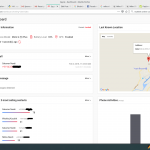5 Tips For Sustainable Living On A Budget
With the birth of the new eco-conscious consumer, a whole new market has emerged for new eco-friendly products. Many influencers and celebrities can be found promoting these products, encouraging everyone else to follow suit.
The only problem? Not everyone has the disposable income available to invest in expensive eco-friendly alternatives.
That does not mean that you are powerless or that you cannot make a difference in the fight against climate change. That is why I thought I would share some of the cheapest ways to live life a little greener.

Image Credit: Unsplash
1. Ditch the plastic bags
When it comes to your weekly shop, there are many eco-friendly swaps you can make to reduce your impact on the planet. Perhaps the simplest swap is to invest in a reusable bag. Single-use plastic bags are causing huge issues for the environment and for our health. Research has shown that microplastics can even be found in some of our food and water supplies.
That does not mean that you have to go out and buy the latest Chanel bag to carry your weekly shopping in though. You can buy reusable canvas bags for cheap in most supermarket stores or you can even snag one for free at some events. These bags can be re-used each week and unlike plastic bags, will not take thousands of years to decompose.
2. Become a second-hand style icon
Speaking of microplastics, another huge perpetrator of plastic pollution is the fast fashion industry. Synthetic materials are resulting in huge amounts of microplastics being released into our environment. Recent studies discovered that the fast fashion industry was responsible for 10% of global carbon dioxide emissions.
One simple way to stop contributing to this level of pollution is to shop second-hand. Shopping in charity shops is both fun and cheap. You will be surprised by what you can find hiding between those grandad cardigans. The rise in popularity of vintage clothing also means it is easier than ever to buy preloved clothing using apps and websites such as eBay or Amazon.
3. Time for a different diet
When talking about sustainability, diet can be a very hot topic. Agriculture is one of the biggest contributors to greenhouse gas emissions due to the methane that is produced when rearing cattle. One way to consume a lower impact diet is to eat more plants and consume less meat. Fruits and vegetables are a lot cheaper to buy than meat and dairy products.
So, this lifestyle change could have a positive impact on both your purse and the planet. Of course, that does not mean you have to ditch meat and dairy completely. If you still find yourself craving those products, treat yourself every now and then and try to support small local farms where possible.
4. Drive Less
Do you drive to work when you know it probably isn’t necessary? Could you make it to work on a bike if you just woke up 30 minutes earlier? Is there a bus stop right outside your house that you somehow forgot existed? Walking to work or to the grocery store reduces your carbon footprint, gives you more exercise, and helps your wellbeing.
If you need to drive to work, you can consider hiring car pooling service in South Florida with colleagues and try to squeeze in your daily errands during your journey. This will reduce the amount of petrol you use and also reduce the number of emissions you release into the air.
5. Switch It Off
Being more mindful of your electricity and water usage can be beneficial for both you and the planet. Turning off a light when you leave the room, putting on a jumper instead of putting on the heating, and unplugging your appliances when they are no longer in use could save you money on your monthly bills and reduce the impact that your energy usage is having on the planet.
Summing up
These have been a few budget-friendly ideas for helping the planet without emptying your pockets. You don’t need a drastic lifestyle change to do your bit. You just need to make some small changes to your daily habits. You don’t need to buy any fancy re-usable items or stop buying clothes or become a monk. You can fight against climate change one small step at a time.
















